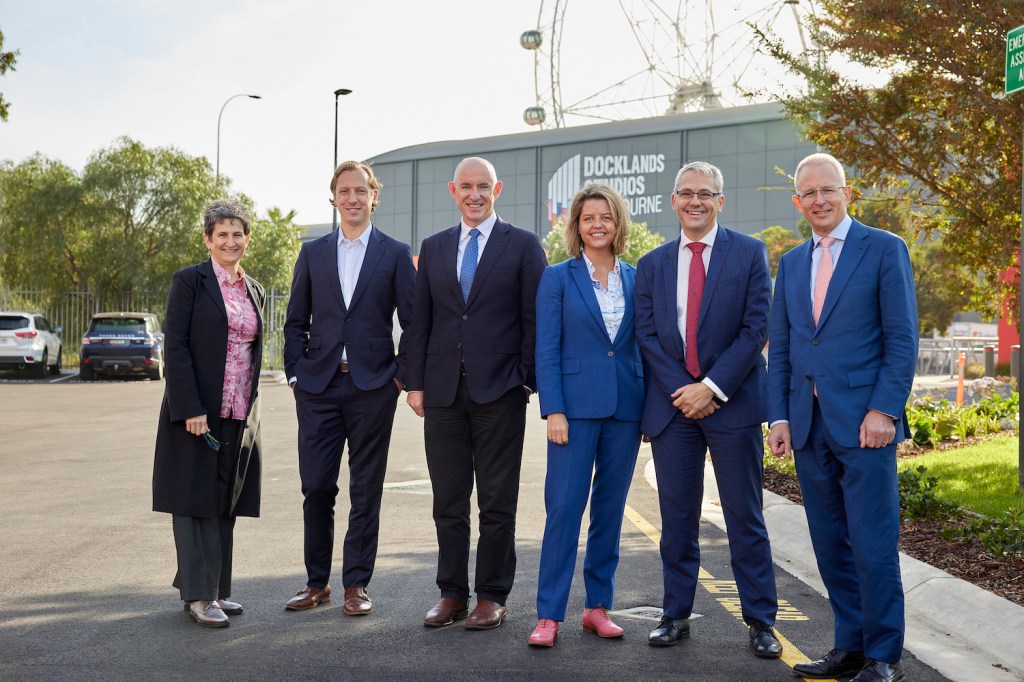AppleTV+’s Metropolis will shoot in Victoria, with both state and federal governments also investing in new virtual production infrastructure and training at Docklands Studios Melbourne to support.
Metropolis is the latest project from Sam Esmail (Mr Robot, Homecoming, Gaslit) and is based on Fritz Lang’s 1927 cult sci-fi film, which was set in a dystopian future city marked by sharp divide between the working class and the wealthy elite.
AppleTV+ officially ordered the eight-part series last month, to be produced by UCP, a division of Universal Studio Group and Esmail Corp.
Esmail writes and directs all episodes while also serving as showrunner and executive producer.
Metropolis will be one of the largest productions to ever shoot in Victoria, and adds to the Universal Studio Group projects lured to Australia over the past two years, including two seasons of Young Rock, two seasons of La Brea, Irreverent and Joe vs Carole.
The Federal Government announced today it is providing $83.8 million in Location Incentive funding for a further pipeline of projects, including Metropolis, with the Victorian Screen Incentive also contributing $41.6 million to the project.
Metropolis is expected to contribute $188 million to the economy, creating jobs for 700 cast and crew and a further 2,500 employees. An estimated 700 local businesses and service providers will also benefit.
The Victorian government will provide $12.5 million to build the virtual production infrastructure at Docklands, which will include a large, permanent LED volume, as well as a second LED volume adapted for more contained scenes.
Further, the Federal Government will provide an additional $5 million to support students with training in the technology as part of a national upskilling program.
Matchbox Pictures will provide production services to Metropolis, while also leading the LED volume build.
COO Matt Vitins said Australia’s strong history and reputation in visual effects and game development meant it was well placed to take a “world-leading” position in the application of virtual production technology.
“This latest pipeline of projects, as well as the investment in infrastructure and training, will position Australia for a decade of high-end work in virtual production driven film and television shows,” he said.

The upgrade for Docklands follows the recent opening of its new $46 million, 3,700 square metre sound stage, which has increased the facility’s capacity by 60 per cent and helped to lure projects like Michael Gracey’s Better Man.
Victorian Minister for Creative Industries Danny Pearson said: “With this industry-leading infrastructure capability, we’re putting Victoria at the forefront of the global screen industry. Together with the recent addition of our new super sound stage, this will make Victoria the go-to place for ambitious screen productions.”
Under the federal training initiative, trainees will be placed with visual effects houses, games developers and other companies engaged in virtual production workflow.
Universal Studio Group and Matchbox Pictures will also establish a partnership with the Victorian College of the Arts (VCA) that will enable students to develop technical skills in virtual production.
Minister for Communications, Urban Infrastructure, Cities and the Arts Paul Fletcher said: “The massive LED screens which will be used on Metropolis are at the very forefront of global screen technology. This technology will become more and more widely used in film and television production in coming years.
“The funding provided for Metropolis responds to this outstanding opportunity for the Australian screen sector, firstly to achieve a permanent installation of this world-leading technology which can be used by other productions as well; and secondly, to train Australian screen professionals in the use of this technology, helping them keep their skills at world-leading levels.”


